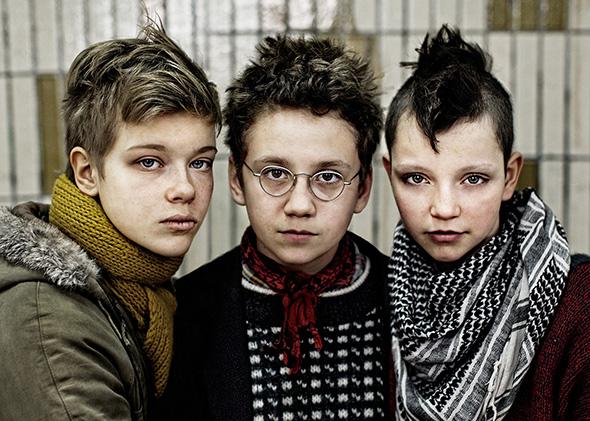The unnamed punk band formed by the intrepid 13-year-old protagonists of Lukas Moodysson’s We Are the Best!—a wonderful Swedish comedy I foolishly missed when it opened in theaters earlier this summer, but that’s now available streaming on Amazon and through iTunes—is more of an idea, really, than a band. Only one of the three girls, Hedvig (Liv LeMoyne), knows how to play a single note of music—a devout Christian, she’s an accomplished classical guitarist and the most straitlaced, un-punk-rock kid you could hope to meet. But her bandmates, drummer Bobo (Mira Barkhammer) and bassist Klara (Mira Grosin), make up in attitude what they lack in musical talent. They’re defiantly ungirly girls with baggy clothes and androgynous chopped haircuts (Klara’s is a Mohawk) who’ve already figured out they don’t stand a chance of fitting into the rigid social and gender hierarchies of their middle school (the film is set in Stockholm in 1982.)
Motivated largely by their desire to annoy a self-important band of older teenage boys who perform under the name Iron Fist, Bobo and Klara sign up to use the instruments and rehearsal space available at a neighborhood community center. (Is this a thing in Scandinavia—free after-school rec centers where kids can hang out and play music? Cue mass sigh from American parents used to shelling out cold, hard cash for every minute of child care.) They conscript the wholesome Hedvig as their guitarist, coaching her in the sullen joys of adolescent alienation while she tries, with minimal success, to teach them the basics of three-chord songwriting. The girls’ signature number, “Hate the Sport,” is a caterwauling critique of their despised gym teacher and all he stands for (sample lyric: “They’re bombing all our towns and cities/And all you want is more tennis committees”).
A less original and insightful movie with this same setup might trace the growth of the girls’ self-confidence in tandem with their improvement as musicians, culminating in a triumphant performance. Instead, Moodysson (working from a script co-written with his wife Coco Moodysson, based on her graphic novel) shows us how little it matters if the band ever improves. It’s the mere existence of the band—the sense it gives the girls of their collaboration as a special, secret source of power and belonging—that equips its members with the unflappable conviction expressed in the title. We Are the Best! is the rare film about childhood friendship that seems to take place inside the world of children, not filtered through an adult scrim of nostalgia. Every one of the young actresses is note-perfect: Barkhammer as the outwardly sarcastic but inwardly lonely Bobo, Grosin as the loudmouthed provocateur Klara, LeMoyne as the quiet, deliberate peacemaker Hedvig. The movie is at its best when Moodysson—who’s always specialized in stories about kids poised at the brink of adolescence, sometimes in bleak circumstances (A Hole in My Heart, Lilya 4-Ever), sometimes in ordinary life (Together, Show Me Love)—lets his three rebellious heroines simply exist and interact as the overgrown children the actresses still are, collapsing in laughter during a cafeteria food fight or negotiating their first stiff flirtations with a like-minded group of punk-rock-loving boys.
“Don’t call us a girl band,” Klara snarls after a counselor at the girls’ youth center approaches them about playing a show in another town. We Are the Best! wears its feminist cred lightly, but with pride. A long scene in which that same counselor condescendingly adult-splains to the girls how to hold and tune an electric guitar—only to watch Hedwig take the instrument from him, retune it correctly, and shred her way through a solo punk cover of a popular Swedish song—will have not only aspiring tween rockers but plenty of adult women who have sat through similar lectures cheering in their seats.
“Name one good thing in my life,” a sulky Bobo demands of Klara late in the film, after a long day of standard-issue adolescent heartbreak. “You’re in the greatest band in the world,” her best friend assures her half-jokingly—and we know that, whether or not these two manage to shamble their way through the upcoming public performance of their single, unlistenable song, she’s right.
